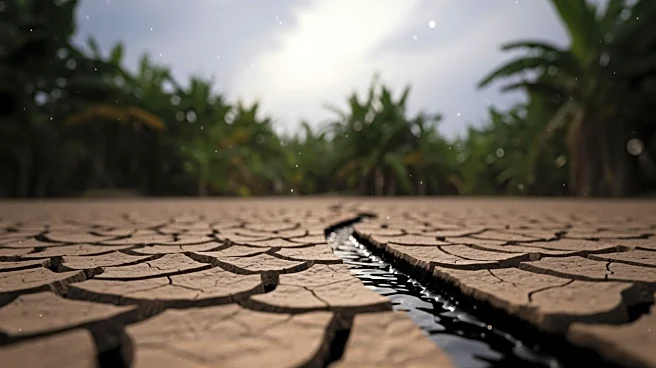What's Happening?
London's High Court has found mining company BHP liable for the 2015 dam collapse in Brazil, which is considered the country's worst environmental disaster. The collapse resulted in the deaths of 19 people,
extensive pollution of the river, and destruction of hundreds of homes. The civil lawsuit, representing over 600,000 individuals including civilians, local governments, and businesses, is valued at up to £36 billion ($48 billion). BHP plans to appeal the ruling, arguing that many claimants have already received compensation in Brazil. The dam, owned by Samarco—a joint venture between Vale and BHP—was used to store waste from iron ore mining. Its failure released millions of cubic meters of toxic waste and mud, devastating communities and poisoning the river.
Why It's Important?
The ruling has significant implications for BHP and the mining industry, highlighting the accountability of corporations for environmental disasters. The decision could lead to substantial financial liabilities for BHP, affecting its operations and reputation. It underscores the importance of corporate responsibility and environmental safety standards, potentially influencing future regulations and practices within the industry. The case also emphasizes the role of international courts in addressing global environmental issues, setting a precedent for similar cases worldwide. The affected communities in Brazil stand to gain from potential compensation, although the legal complexities may prolong the resolution process.
What's Next?
BHP is expected to appeal the High Court's decision, which could lead to prolonged legal proceedings. The appeal process may involve further scrutiny of the company's practices and the adequacy of compensation provided to the victims. Stakeholders, including environmental groups and affected communities, will likely continue to advocate for accountability and fair compensation. The case may prompt discussions on improving international legal frameworks for environmental justice and corporate accountability. Additionally, the outcome could influence other pending lawsuits against Samarco's parent companies, including Vale, in different jurisdictions.
Beyond the Headlines
The case raises ethical questions about the responsibilities of multinational corporations in preventing environmental harm and addressing the needs of affected communities. It highlights the challenges faced by vulnerable populations in seeking justice and fair compensation, especially when legal proceedings are conducted in foreign jurisdictions. The involvement of Pogust Goodhead, a firm representing human rights and environmental law, also brings attention to the complexities of legal representation and the potential for exploitation of claimants. The disaster serves as a reminder of the long-term environmental and social impacts of industrial activities, urging a reevaluation of safety standards and corporate practices.









